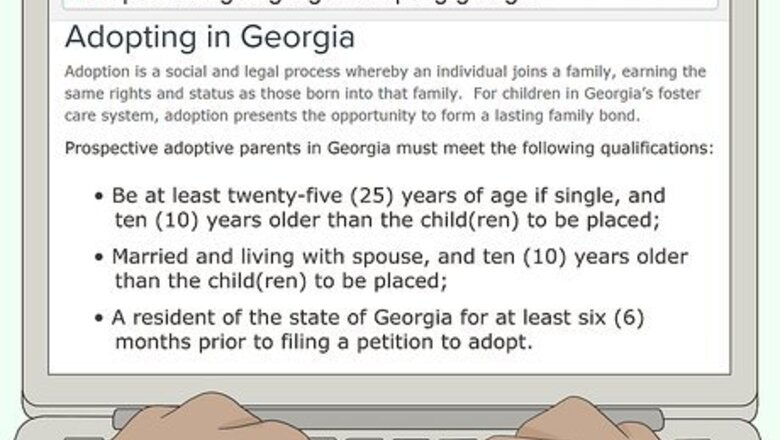
views
X
Trustworthy Source
State of Georgia
Official website for the State of Georgia
Go to source
Choosing an Adoption Facilitator
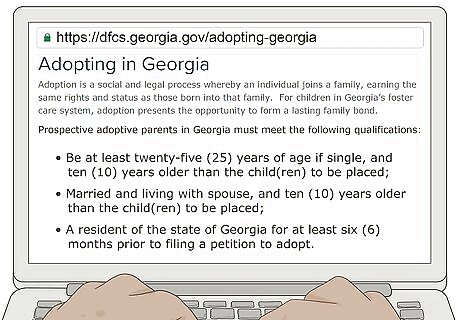
Confirm that you're qualified to adopt in Georgia. The state of Georgia has basic requirements that you must meet if you want to adopt a child. None of these requirements relate to your educational background or family income. You simply must be willing and able to care for a child. In addition, you must be: At least 25, if you're adopting as a single parent, and at least 10 years older than the child you're adopting At least 10 years older than the child you're adopting, if you're married and live with your partner (although there's no minimum age requirement beyond the minimum age to marry in Georgia) A Georgia resident for at least 6 months before you apply to adopt a child Without any criminal convictions for child neglect, child endangerment, or child abuseTip: Private adoption agencies may have additional criteria you have to meet. For example, faith-based adoption agencies may require you to be a member of a particular religious faith.
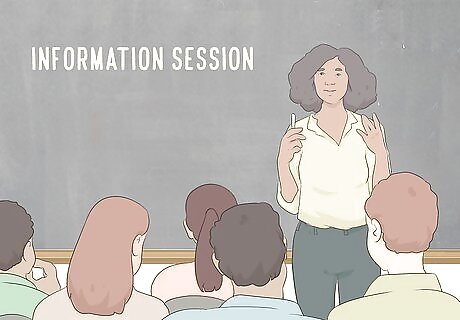
Go to an information session to learn more about adoption. Contact DFCS at 1-877-210-KIDS (1-877-210-5437) and let them know that you're interested in adopting a child. They will get basic information about you and your family and send you an information packet. After reading through those materials, sign up for an information session near you so you can learn more about the adoption process and ask caseworkers any questions you might have. The information session covers the process of adopting a child through DFCS. However, even if you think you're probably going to use a private agency, you can still get a lot out of this session. If you decide to adopt through DFCS, a caseworker will visit your home after the information session for a brief visit. The caseworker will look over the space you have available in your home and talk to you and other family members about the adoption process.

Work with DFCS if you want to adopt a child in state custody. Children available for adoption through DFCS are children currently in the state foster care system. Most of these children have special needs and may have experienced physical or emotional abuse. Financial assistance is available if you adopt a child with special needs through DFCS. In some cases, you may not have to pay any money at all in adoption fees. However, even if you end up paying adoption fees, adopting through DFCS is generally less expensive than using a private adoption agency. Many of the children available through DFCS are older children and teenagers. If you want a young child or an infant, you'll typically have better luck adopting through a private agency. Even then, you can expect to wait longer if you want to adopt an infant.
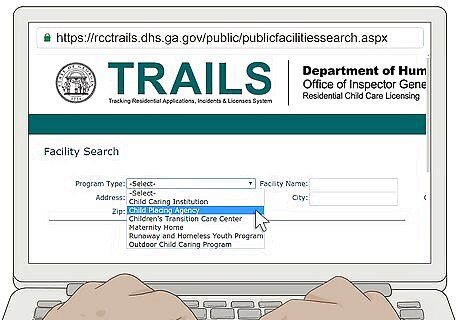
Contact a private agency if you want more control over the placement. When you adopt through DFCS, you typically don't have a lot of choice in terms of the type of children available. Private agencies, on the other hand, typically focus on children who are not in state custody, including infants. You may also be able to specify age, gender, and other attributes of the child you want to adopt. If you want to adopt a child who lives in a different state or another country, you have to go through a private agency. The DFCS doesn't handle interstate or intercountry adoptions. For a list of private agencies that are licensed in Georgia, visit https://rcctrails.dhs.ga.gov/public/publicfacilitiessearch.aspx and select "Child Placing Agency" from the drop-down menu next to "Program Type." You can also look up agencies by name at http://www.georgiaadoption.org/, the website for the Georgia Association of Licensed Adoption Agencies. These listings will give you more information about each of the agencies and their requirements.
Applying to Adopt a Child

Fill out an application form. If you decide to adopt through DFCS, you'll get an application form at the informational session. This form asks for basic information about you and your family, including your educational, employment, and criminal background. Private agencies have their own applications that may ask for additional information. For example, if you're using a faith-based agency, you may need to provide information about your church and name church leaders who could serve as references for you. These applications put all of your basic information together in one place so your caseworker can make sure you meet the basic qualifications to adopt a child. Make sure you answer all the questions completely and honestly. Having a criminal conviction in your past, for example, might not disqualify you from adopting a child. However, lying about it or trying to cover it up likely would result in your application being rejected.
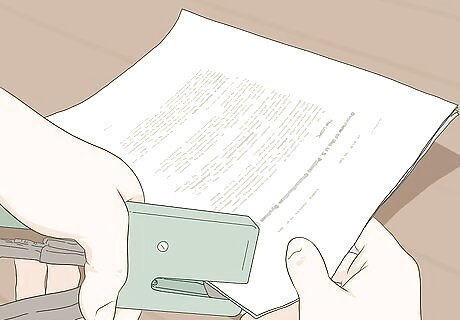
Provide required documents for your home study. Whether you're adopting through the DFCS or a private adoption agency, you'll need to gather documents to support most of the information you provided in your application. Your caseworker will provide you with a list of documents you'll need to submit. Some documents you'll likely need include: Health records or reports for each family member Birth certificates for each family member Marriage certificates or divorce decrees Criminal background checks Financial records and tax returns Employment information and educational records At least 3 reference letters from people not related to you

Complete your pre-adoption training. All prospective adoptive families must complete an adoption preparation program. If you're adopting through a private agency, that agency may have its own program, or you may be able to take the program through the DFCS. The DFCS program consists of 23 hours of classroom training. Go to http://fostergeorgia.com/impact-pre-service-training/ to learn more about the DFCS program or find a location near you where the training is being held.
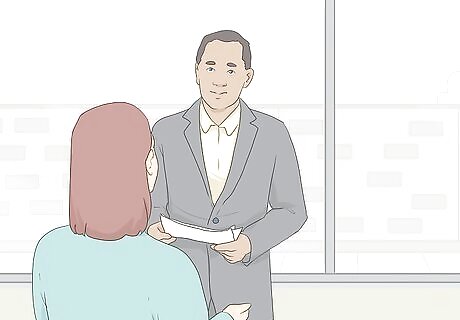
Work with your caseworker to complete your home study. During the home study, your caseworker will visit your home at least twice to interview you and members of your family as well as assess the safety of your home. If you're married, you and your partner will be interviewed both together and separately. Based on their assessment, your caseworker may ask you for additional documents or suggest changes to make your home safer for an adoptive child. Follow through with these requests as soon as possible to avoid delays in processing your application. Your caseworker will also probably want to interview other family members who don't live with you if they are going to be spending significant amounts of time with your adoptive child.Tip: Be open and honest throughout the course of your home study. The caseworker is not looking for reasons to deny your application. They'll do everything they can to ensure you're approved to adopt a child if they believe you would provide a good home.
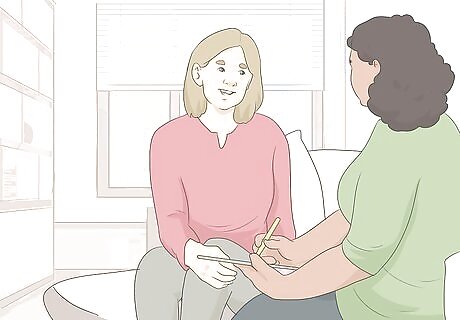
Meet with your caseworker to go over your home study report. Once the home study is complete, your caseworker will sit down with you and go over their assessment. They will likely have recommendations regarding the types of children you can adopt and may have some ideas for which children would be the best match for your family. For example, the caseworker may restrict you to adopting children under 10. They would explain the observations that led them to this conclusion. If the caseworker concludes after the home study that you should not be approved to adopt a child, they'll give you the reasons for that denial. It may be something you can work on, and then you can apply at a different time. For example, you might need to make repairs to your house so it is safe for a child. Caseworkers do everything they can to approve prospective adoptive parents. However, there are a few things that can cause you to be permanently ineligible to adopt, such as if you have a criminal conviction for child abuse or are registered as a sex offender.

Create an adoptive family profile. Once you're approved as prospective adoptive parents, you'll have the opportunity to design a profile that children and caseworkers can look at to evaluate you as a potential match. Include lots of pictures of your home and family, a summary of your household, a description of your home and neighborhood, and information about activities that you enjoy together as a family. It's a good idea to look at other family profiles before you make your own. This may give you some ideas for ways to make your profile stand out from the crowd. Ask your caseworker for some examples of family profiles. If you're doing an open adoption through a private agency, you may also need to write a letter to the child's birth mother. In this letter, you'll talk about the reasons you chose adoption and the kind of home you'll provide for the child.Tip: When writing a letter to the birth mother, be compassionate and respectful of the difficult choice she's making. Express gratitude towards her for allowing you to raise her child.

Look at photos and information about children who are available. While your profile will be available to caseworkers and children available for adoption, each child also has a profile that tells prospective adoptive parents a little about them. Your caseworker will give you more information on how you can look through these profiles. Typically, they are available online. You can also attend adoption parties and match meetings locally to meet children who are available for adoption and spend some time talking and playing with them. Many of these parties and meetings are relatively informal settings that give the children and prospective parents plenty of time to interact with each other.
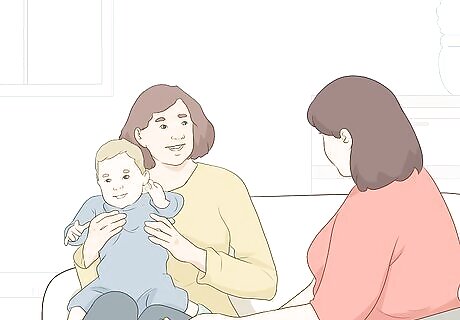
Visit with your prospective child. If you find a child you're interested in, let your caseworker know. Your caseworker will then start the process of potentially placing that child in your home. Expect to have several initial meetings with the child in a neutral, public setting. If those go well, you can have the child visit in your home. Typically, these visits will be unsupervised, although your caseworker will likely speak with you and the child when they drop the child off and pick them up. Before the child is placed in your home, your caseworker wants to make sure that the placement would be in the best interests of the child and that everyone gets along well together. If you have other children, the caseworker will evaluate how well all the kids get along as well. If the visits don't go well or you're not convinced the child would be a good fit for your family, tell your caseworker as soon as possible so you don't get the child's hopes up. Your caseworker will help you look for another child. Likewise, the child may indicate to your caseworker that they don't want to go through with the adoption.
Finalizing the Adoption
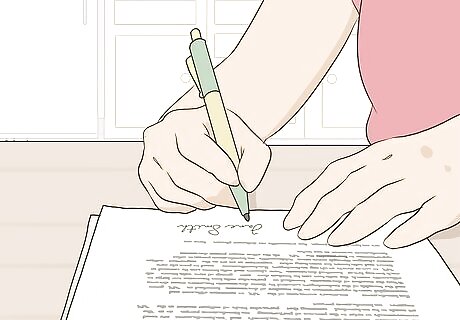
Sign a Placement Agreement. The Placement Agreement officially places the child in your home. After you sign the agreement, the child will come to live in your home permanently. You can start the process of integrating the child into your daily routine and starting your lives together. Placement Agreements are only used if you adopt a child through DFCS, although private agencies may have similar documents. If a child with special needs is placed in your home through DFCS, your caseworker will work with you to apply for adoption assistance.
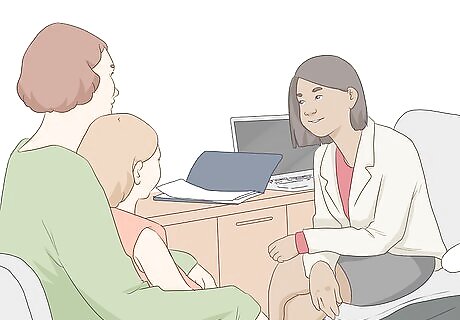
Wait for the release from DFCS. If you adopt a child through DFCS, your caseworker will visit the child in your home at least twice before releasing the child from state custody. You cannot file your petition to finalize the adoption until these visits are complete. This process typically takes at least a month. The first home visit can take place at any time after the child is placed in your home. The second home visit takes place 30 days later if you've adopted a child more than 12 months old. If you've adopted a child less than 12 months old, there will be at least 2 weeks between the 2 home visits. During the home visits, your caseworker will observe you and the child together. They may also interview you and the child (if they're old enough) to find out how things are going since the child moved in and how the child is adapting to your life together.

Hire an attorney to file your adoption petition. While it would be possible to draft an adoption petition on your own, it's generally best if you hire an attorney to draft the petition and file it on your behalf. That way, you can avoid any errors that could put the adoption at risk. Look for a family law attorney who specializes in adoption. Typically, you'll get a free initial consultation. Take advantage of this opportunity to interview 2 or 3 attorneys so you can find one you like the best. If you're adopting a child with special needs through DFCS and qualify for adoption assistance, some if not all of your attorney's fees will probably be paid for.Tip: If you're adopting your child through a private agency, they likely have specific attorneys that they regularly use. Ask your caseworker if there's a specific attorney you should use.
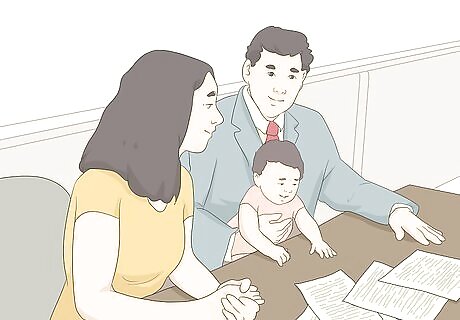
Attend a court hearing to get your Adoption Order. Once your attorney files your adoption petition, a hearing will be scheduled at the courthouse in your county. Your whole family and your adopted child should attend this hearing. Dress as you would for a church service or job interview. Adoption hearings are typically more informal than other court hearings and have a celebratory air. The judge will ask you questions about the adoption petition and may talk to your adopted child as well (if they're old enough to answer questions). After the judge is satisfied that the adoption is in the best interests of the child, they will sign the adoption order. From that point, your adopted child is officially a part of your family.
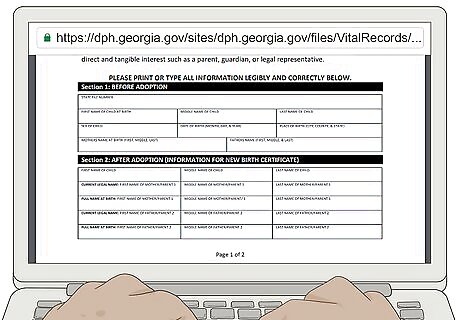
Get your child's new birth certificate. The adoption order doesn't change your child's birth certificate automatically. You can order a new birth certificate that lists you as the child's parent (along with your partner, if you're married) and changes their surname. You can order new birth certificates from the Georgia Department of Public Health (DPH). Go to https://dph.georgia.gov/sites/dph.georgia.gov/files/VitalRecords/Certificate%20of%20Adoption%20%28Form%203927%29.pdf to download a copy of the application for a new birth certificate. Print the form and fill it out completely, then mail it to the address on the application. Your application must be accompanied by a photocopy of the front and back of a valid photo ID as well as the processing fee. As of 2019, you'll pay a $10 processing fee, $25 search fee, and $5 for each copy of the birth certificate you order. One certified copy will be provided to you automatically. For example, if you wanted to order a new birth certificate and get 2 additional copies, you would pay a total of $45. The DPH would send you 3 copies of the birth certificate in the mail.
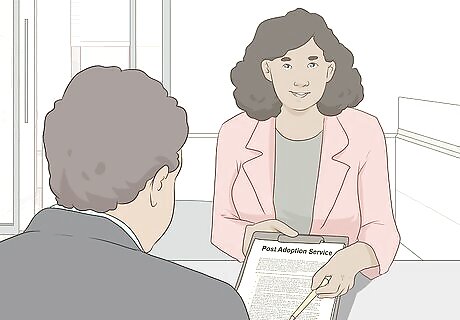
Sign up for post-adoption services if your child is eligible. There are some supportive services available to all adoptive families living in Georgia through the Georgia Center for Resources and Support. Other post-adoption services are only available to children with special needs adopted through DFCS. Your caseworker will let you know what types of programs are available for you. Some services may provide funding and resources for you to care for your adoptive child, including providing for medical and dental care or therapy and counseling as needed. You may also be able to attend workshops and seminars or join support groups that will help you deal with some of the challenges of adopting a child with special needs.











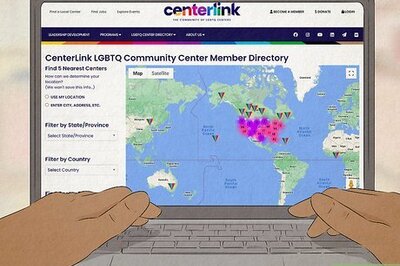




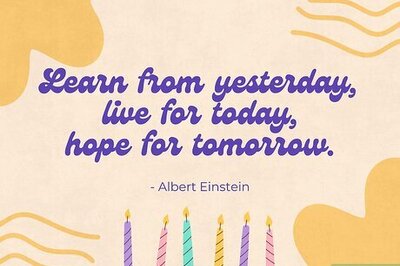

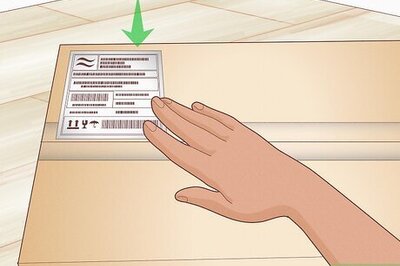

Comments
0 comment